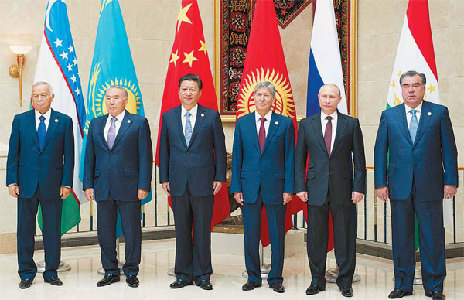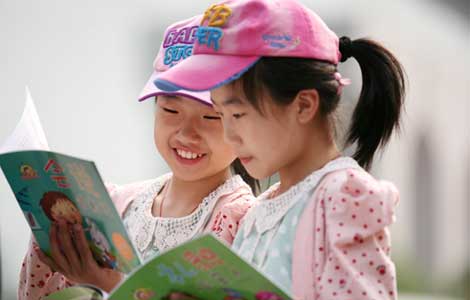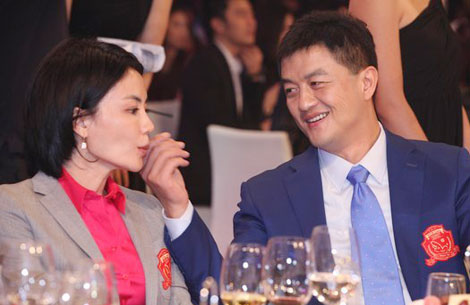Optimize environment for human rights development
Updated: 2013-09-14 08:10
By Luo Haocai (China Daily)
|
||||||||
Luo Haocai, president of China Society for Human Rights Studies
In September, a golden season in China, we are happily gathered together in Beijing to hold the annual Beijing Forum on Human Rights, discussing experiences and achievements in human rights and planning together human rights development.
This session of the Forum is themed "Constructing an Environment for Sustainable Human Rights Development". Human rights are not isolated; rather, they are human rights situated in society, the network interwoven with economy, politics, society, culture and so on, and human rights protection has to depend upon certain interior and exterior environments and institutional arrangement.
As early as in 1948, the Universal Declaration of Human Rights has pointed out: "Everyone is entitled to a social and international order in which the rights and freedoms set forth in this Declaration can be fully realized." The realization of human rights not only involves the claim to rights themselves, but also the demand for such environment as is favorable to human rights development.
The major point of our human rights protection is to create an order favorable to the full realization of human rights and build the environment for sustainable human rights development. Both governments and people of all countries are obliged to create the environment and order favorable to the realization of human rights, and guarantee sustainable human rights development.
Now, I would like to express a few of my personal opinions and discuss them with everyone:
First, we should insist on running the country by law and, building a country of governance by law, and providing institutional guarantee for the sustainable development of human rights.
Human rights and governance by law are inseparable; the construction of governance by law not aiming at human rights is blind, and the protection of human rights without governance by law is impossible. On the one hand, human rights protection cannot do without the construction of governance by law. Law establishes the identity of a man as a subject, declares the basic contents of human rights, defines the measures to realize human rights, and set up the mechanisms of responsibility assignment against the infringement of human rights.
In a word, it takes the form of the Constitution and laws to guarantee the realization of such basic value objectives of human rights as personal dignity and human value. On the other hand, the construction of governance by law also boosts the constant improvement of human rights protection. Law is the study of rights, while human rights are the kernel of all rights, and an improved system of human rights protection certainly represents the improvement of law and the progress of governance by law.
Since the last session of the Forum, the system of socialist law with Chinese characteristics has been constantly improved, the construction of governance by law has been pushed forward step by step, and human rights protection has made progress steadily. In 2013, a series of laws have been formally carried out after amendment, including the Criminal Procedure Law, the Civil Procedure Law, the Law on Protection of the Rights and Interests of the Elderly and the Labor Contract Law, and the deepening of human rights protection has been continued.
In the first half of this year, the National People's Congress has also solicited and extensively adopted public opinions for the Draft Amendment to the Consumer Protection Law, the Amendment to the Environmental Protection Law of the People's Republic of China (Second Review Draft) and so forth. Besides, the amendment to the Administrative Procedural Law, which is the basic criterion for "administrative litigations", has been included both into the overall legislative plan of this session of the National People's Congress and its particular legislative plan in 2013.
At the beginning of this year, the reform of re-education through labor system has been initiated, and it can be expected that the measures for re-education through labor would be ceased within this year after it is approved by the Standing Committee of the National People's Congress. The reform of the petitioning (letters and calls) system is also in the process of exploration, and the petitioning involving laws and lawsuits can be expected to be separated from ordinary petitioning and include the scope of rule by law.
Recently, the Political and Judiciary Commission Under the Central Committee of the Communist Party of China has proclaimed a guideline for the practical prevention of unjust, false and erroneous cases, reiterated such basic principles in lawsuits as being innocent until proven guilty and the guarantee of lawyers' rights to defense, and specified the demand for quality in handling cases and responsibility assignment.
To respect and guarantee human rights is the solemn declaration of the Constitution of China, and to govern the country by law and build a socialist country of governance by law has also been written into the Constitution as a basic guideline for the governance of the country. Human rights and governance by law are constitutionally consistent.
In the future, China will continue to push forward the rule by law from all aspects, integrate the country of governance by law, the government of governance by law and the society of governance by law, boost from all aspects scientific legislation, strict law enforcement, righteous justice and all-round law-observance under the guidance of the Constitution, and take the form of governance by law to boost scientific development, maintain social steadiness and practically guarantee human rights.
Secondly, we should insist on the orientation to people's livelihood, boost social reforms and lay a firm foundation for the promotion of sustainable human rights development.
Social construction, together with economic construction, political construction, cultural construction and ecological civilization construction, ranks among the five important parts, which constitute the overall plan of socialism construction with Chinese characteristics. In strengthening social construction, emphasis should be laid on the guarantee and improvement of people's livelihood, mainly including the most practical issues of interests which most directly concern the people such as education, employment, healthcare, residents' incomes, social insurance and so forth. The basic requirement and major path are the accelerated reform of the social system. Strengthened social construction is an important part of the construction of environment for sustainable human rights development, and an important guarantee for social harmony and stability.
The strengthening of social construction shall always lay emphasis on the guarantee and improvement of people's livelihood, and highlight the orientation of human rights protection to people's livelihood. The profound Chinese thought of people-orientation and the Chinese tradition of care for people's livelihood, both of which have a long history, determine that human rights protection in China must give priority to people's livelihood, lay emphasis on people's livelihood, and be oriented toward people's livelihood.
The priority to people's livelihood means to care for the most basic requirement and guarantee of people's subsistence and livelihood, and give priority to the rights to subsistence and development. The emphasis on people's livelihood means to take the guarantee and improvement of people's livelihood and the improvement of people's material and cultural standards of living as the very purpose of all the work of the government. And the orientation toward people's livelihood means to view the guarantee of people's livelihood as the very foundation of human rights protection. China has constantly increased its investment in people's livelihood. In the past five years, the expenditures of public finance by the Central Government on people's livelihood have added up to 16.89 trillion yuan ($2.76 trillion), with an annual increase of 21.1 percent, and steadily accounting for more than two-thirds of the total expenditures of public finance by the Central Government.
The strengthening of social construction entails the accelerated reform of social systems, the transformation of functions, the rectification of mechanisms, and the overall planning of the cooperation of all forces in the society for the improvement of human rights protection.
First, we should handle well the relations between the government and society, and strengthen cooperation between power and rights. There are both rivalries and cooperation between power and rights, and the relations between these two should be viewed from a dialectical point of view, and we should abandon adversarial thinking and intensify the awareness of cooperation, handle the relations between power and rights as a whole from the point of view of balance, and make concerted efforts for the promotion of human rights. Secondly, we should speed up the formation of a basic public service system, realize basic human rights protection, and guarantee social justice and righteousness. Thirdly, we should release the vigor of society, accelerate the formation of a modern system of social organizations, give play to such non-governmental organizations as associations of human rights studies, make social organizations a bridge between the governments and the populace, and form a social structure for the governments, enterprises and social organizations to interact, cooperate and circulate in a benign way.
At the beginning of this year, the National People's Congress initiated a new round of reform of governmental institutions. This reform lays emphasis on the transformation of governmental functions, the regulation of governmental power, the decentralization of power and its granting to markets and society, and its final purpose is to allow a bigger share of interests to the people and return the power to the people.
Administrative examination and approval are the breakthrough point for the reform. In the past 10 years, the Central Government has abolished and adjusted 2,497 items which formally required administrative examination and approval, accounting for 69.3 percent of formal total items. Now, this session of the government will reduce within its term more than one-third of the excising 1,700-odd items of administrative examination and approval, which involve all departments of the State Council.
With the cooperation between the State and society, the government and non-government organizations, and power and rights on the basis of balance, China has found a path of human rights protection featuring the cooperation between rights and power, which is within the framework of the Constitution and laws, and lays emphasis on people's livelihood. The protection of human rights has been boosted in many aspects, and society has remained harmonious and orderly.
Thirdly, we should strengthen international cooperation and guarantee world peace to create a benign environment for the promotion of sustainable human rights development. Peace, security and human rights have different connotations but are intrinsically consistent. On the one hand, peace and security have increasing scopes, including human rights, governance by law, democracy and so forth, and systems that systematically encroach on human rights are thought to be threats to peace and international security. On the other hand, human rights protection and peace maintenance depend upon each other. Human rights may be threatened by military conflicts, while the systematic infringement against human rights is one major cause of national, religious, social and political tensions, and often worsens into unsteadiness or military conflicts.
The maintenance of regional security, the guarantee of international peace and the protection of human rights have been the major concerns of the United Nations all along. Since World War II, the international law on human rights and the international protection mechanism of human rights have been rapidly developed as a response to Nazi tyranny.
Today, international protection of human rights is not only viewed as a basic obligation defined by the international law, but also a major task of the international community. Globalization calls for global cooperation, and strengthened multilateral cooperation and the UN's role are not only the necessary choice of all countries, but also a requisite measure for the international community to effectively meet common challenges.
All countries are obliged to carry out their undertakings in the Charter of the United Nations and the Universal Declaration of Human Rights, pay attention to exchanges, improve understanding and strengthen cooperation. That is not only the basic requirement for sustainable human rights development, but also the responsibility of each government, non-governmental organization and individual.
For years, China has adhered to principles, actively mediated, promoted peace and boosted negotiation with regard to a series of international and regional burning issues, making important contributions to the maintenance of regional peace and steadiness. China will continue to carry the banner of peaceful development and win-win cooperation, keep up the spirit of equality, mutual trust and tolerance, learn from others, engage in win-win cooperation, firmly stick to the path of peaceful development, play the part of a responsible large country, resolvedly guarantee the sovereignty and development of the State, maintain regional security and world peace, and boost the full and all-round realization of human rights protection.
On the path of sustainable human rights development, of course, we are still facing many problems, and the task is still very arduous. The concrete contents of human rights and their protection routines are dynamic and evolving, and human rights development is not limited to a single lane. Countries vary in terms of environments when they strengthen human rights construction and protection, and they have to seek their own paths of sustainable human rights development which conform to the stages of their economic, social and cultural development.
We live in the same global village and share the same dream of human rights and development. Each of our gatherings is a step toward the realization of this dream, and each effort will be a contribution to human rights. This year marks the 65th anniversary of the Universal Declaration of Human Rights, the 20th anniversary of the Vienna Declaration and Programme of Action, and also the 20th anniversary of China Society for Human Rights Studies.
Since its opening in 2008, the Beijing Forum on Human Rights has held six sessions consecutively, with each session under a different theme. All these sessions have reached consensus and achieved greatly. Now I wish the Forum to increasingly prosper, and the road of international exchanges and cooperation in human rights to become increasingly broad.
(China Daily 09/14/2013 page5)

 Beijing backs truce bid in Syria
Beijing backs truce bid in Syria
 Parents support stricter rules on children's books
Parents support stricter rules on children's books
 Ouch ... bee therapy causes a real buzz
Ouch ... bee therapy causes a real buzz
 Faye Wong and Li Yapeng shock fans with divorce
Faye Wong and Li Yapeng shock fans with divorce
 World shows flare at Beijing tourism event
World shows flare at Beijing tourism event
 Yao Ming launches new wine
Yao Ming launches new wine
 'Up' comes to life
'Up' comes to life
 Experts discuss Chinese premier's economic plan
Experts discuss Chinese premier's economic plan
Most Viewed
Editor's Picks

|

|

|

|

|

|
Today's Top News
Growth model shift beneficial for Europe, China
End to QE to 'split' emerging markets
Admiral discusses future of China's aircraft carrier
Beijing backs truce bid in Syria
Fukushima plant situation 'out of control'
Taiwan invited to global gathering as guest
IPhone 4 exploded while charging
Fake tickets found out at Louvre
US Weekly

|

|






